Yanmar Prepares for Hydrogen Engine Production

Yanmar Power Solutions has acquired a site in Amagasaki City, Japan, to conduct test runs of marine hydrogen engines.The company says it will develop and build powertrains that can be used with next-generation fuels such as hydrogen, methanol, and ammonia, at the new facility.The complex will enable the company to reorganize its production system, including existing factories, and strengthen its capabilities. It is scheduled to begin operations around March 2029.
Singapore University Leads New Ammonia Engine Project

A new research project at the National University of Singapore (NUS) aims to accelerate the decarbonization of the global shipping industry through the development of next-generation ammonia-fueled marine engines with high efficiency and near-zero emissions.The project focuses on a novel in-cylinder reforming gas recirculation (IRGR) engine concept designed to address key limitations that have so far constrained the wider adoption of ammonia as a marine fuel.Project leader Associate…
Dual-Fuel Liner Fleet Reaches 400 Ships

The World Shipping Council (WSC) has published its latest update to the WSC Dual-Fuel Fleet Dashboard, tracking the global liner shipping industry’s investment in new ships capable of running on renewable and lower-emission fuels.As of December 2025, the number of dual-fuel container ships and vehicle carriers on the water has reached 400, up from 218 in 2024.The number of dual-fuel ships on order has also continued to grow, reaching 726 vessels, despite a flurry of deliveries shifting from the orderbook onto the water.
DNV Alternative Fuel Vessel Orders for January 2026

According to the latest figures from DNV’s Alternative Fuels Insight (AFI) platform, a total of 20 new orders for alternative-fueled vessels were placed in January 2026. Activity continues to be dominated by LNG-fueled container vessels, which accounted for 16 of these orders, with one methanol-fueled offshore vessel and three LPG vessels making up the remainder.“This is a relatively positive start to the year in the alternative-fueled space. LNG has the highest share with the container segment continuing to drive momentum…
Chapman Tapped to Lead VPS in the Americas

VPS appointed Neil Chapman as the company’s Managing Director of the Americas.Chapman has a wealth of experience in Testing and Inspection, having worked for most of the major TIC companies during his 40 year career. More recently he has held senior commercial leadership roles and he has developed a deep understanding of how to deliver tangible value to clients and operating as a true partner, to tackle the everchanging demands of the marine industry.“We are very pleased to have Neil on board…
NYK Invests in XFuel to Advance Low-Carbon Marine Fuels

Japanese shipping company NYK has invested in XFuel, a company developing technology to refine waste-derived liquid hydrocarbons into low-carbon fuel for marine applications.The investment is aimed at advancing collaboration with XFuel, including the recycling of fuel sludge generated from NYK’s operating vessels, to support the development of decarbonization technologies that utilize existing fuels.XFuel has developed proprietary Chemical Liquid Refining (CLR) technology capable of converting waste-derived hydrocarbon liquids into high-purity, low-carbon fuels suitable for marine use.
EU Backs Øresund CCUS Cross-Border Scheme

The European Union has awarded funding to support the development of carbon capture, utilization and storage (CCUS) in the Øresund region, backing a cross-border project aimed at accelerating renewable energy use and enabling the production of sustainable fuels.The three-year project is supported by financing from the Interreg Øresund-Kattegat-Skagerrak program and will establish a Danish-Swedish collaboration platform focused on integrating CCUS into the regional energy system.The…
Singapore Boasts Record 2025

Singapore posted record port performance in 2025, supported by resilient global trade and fuel offtake.The nation achieved a record of 3.22 billion gross tonnage (GT) of vessel arrivals and 44.66 million TEUs of container throughput in 2025 – a 3.5% and 8.6% increase from 2024, respectively.Marine fuel sales also hit a new high at 56.77 million tonnes, a 3.4% increase from 2024, with continued growth in the use of alternative marine fuels, which increased to 1.95 million tonnes in 2025 compared to 1.35 million tonnes in 2024.On 14 January 2026…
MOL PLUS to Invest in Pyxis to Advance Electric Vessel Deployment

MOL PLUS has decided to invest in Pyxis Maritime, a Singapore-based developer of electric vessels and operator of electric boat charging stations, as part of efforts to promote the commercialization of electric vessels and related infrastructure.The investment comes as Singapore advances toward its national net-zero target for 2050. From 2030, all new harbor craft operating in the Port of Singapore will be required to be fully electric, capable of using B100 biofuel, or compatible…
LNG-Fueled Container Ships Prop Up Alternative Fuel Orders in 2025, DNV Finds

LNG-fueled container ships helped sustain the share of alternative fuels in the global shipbuilding orderbook in 2025, even as overall newbuilding activity slowed sharply following a record year, according to data from classification society DNV.Annual figures from DNV’s Alternative Fuels Insight platform show that while total newbuild orders fell to 2,403 vessels in 2025 from 4,405 a year earlier, alternative-fueled ships retained a 38% share of total gross tonnage, supported…
Maersk is exploring more ethanol for green fuel in order to reduce its reliance on China.

The Financial Times published an interview with Maersk's CEO, Vincent Clerc, on Sunday. This could reduce the company's dependence on China, and help the industry to decarbonise.Clerc stated that the U.S. and Brazil are the leading producers of ethanol in the world.Clerc told FT that if all the benefits are concentrated in China then some countries may object. But if they're more evenly distributed then many more will be supportive. It will allow more countries to see the benefits of the green transition. The shipping industry is more difficult than others to reduce emissions.
HHI-EMD Runs Four-Stroke on Ethanol at Full Load

HD Hyundai Heavy Industries, Engine & Machinery (HHI-EMD) has successfully verified that its HiMSEN engine can operate stably on ethanol fuel.The company conducted the tests on its 4-stroke methanol dual-fuel engine platform (H32DF-LM) and confirmed that stable operation at all load points is possible. The test focused on verifying startability, combustion stability, power output stability, and exhaust gas characteristics under fuel property differences, while maintaining the existing methanol engine hardware as much as possible.Ethanol…
Oshima Bulk Carrier Design Earns ClassNK Approval for Alternative Fuels

Japan’s ClassNK has issued an approval in principle (AiP) for a bulk carrier concept developed by Oshima Shipbuilding that is designed to be ready for multiple alternative fuels, including ammonia, methanol and liquefied natural gas (LNG), as well as onboard carbon capture and storage (OCCS).The approval confirms the technical feasibility of the vessel from a regulatory and safety perspective and reflects growing industry efforts to future-proof newbuilds amid tightening emissions rules.The concept design was reviewed in line with ClassNK’s updated Guidelines for Ships Using Alternative Fuels…
Fuel Gas Supply Systems Launched for Next-gen Marine Engines

Nikkiso Clean Energy & Industrial Gases Group (Nikkiso CE&IG) launched a new high-pressure fuel gas supply systems (FGSS) specifically designed to power the next generation of cleaner, more efficient ships with lower emissions and greater efficiency.Nikkiso CE&IG’s innovation in FGSS is engineered to deliver and sustain pressures well beyond today’s standards of 380-420 bar, regardless of fuel source, aimed at enabling the transition to lower-carbon fuels like liquefied natural gas (LNG)…
Renewable Propane Delivers Clean Energy Without the Wait

With lower emissions and proven reliability, it’s the ready-now solution for cleaner port operationsAs demand for cleaner energy grows, port authorities and terminal operators face the challenge of finding environmentally friendly options without increasing budgets or sacrificing productivity. Propane has met these performance criteria at ports for decades, powering everything from terminal tractors and forklifts to shore power and generators. It reduces emissions while ensuring critical operational uptime…
Shipping Majors to Study Methanol Fuel Supply Chain on US Gulf Coast

American Bureau of Shipping (ABS), Japan’s ENEOS, Nippon Yusen Kabushiki Kaisha (NYK Line) and SEACOR Holdings have launched a joint study to develop a commercial methanol marine fuel supply network along the U.S. Gulf Coast.The study aims to establish the first large-scale ship-to-ship methanol bunkering operations in the United States, as the global shipping industry looks for practical pathways to meet the International Maritime Organization’s target of net-zero greenhouse gas emissions by 2050.Methanol…
DNV: Methanol Emerging as Scalable Marine Fuel but Economics Still Limit Uptake
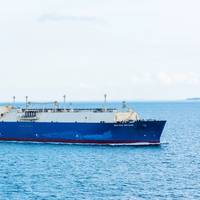
Methanol is emerging as a practical alternative fuel for deep-sea shipping as engines and technical systems reach high readiness levels, but high costs and limited supply continue to constrain wider adoption, classification society DNV said in a new report.As the industry explores multiple decarbonization pathways, methanol is gaining attention as a practical and scalable alternative fuel for deep-sea shipping, supported by over 450 methanol-capable vessels in operation and on order and technical solutions now available for all major ship types.DNV’s latest white paper…
Many Green Shipping Corridors Stalled
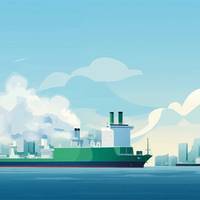
A new report from the Getting to Zero Coalition identifies 25 new green shipping corridors – trade routes designed to demonstrate and scale novel zero-emission fuels, vessels, and technologies – launched this last year, expanding the global total to 84 active initiatives.At a Crossroads: Annual Progress Report on Green Shipping Corridors 2025 reveals that new initiatives have been launched in major developing economies like China, India, Brazil, Chile, Ghana, and Kenya.For the first time since the report’s inception in 2022…
Is There a Viable LNG to Ammonia Fuel Pathway?

Is LNG to ammonia a viable pathway for helping shipowners get to net zero?From an engine point of view there is a pathway, but there are two points to consider, says Lars Tingbjerg Danielsen, Two-Stroke Promotion Manager – Newbuildings at Everllence. First, the case where an engine is capable of burning both methane and ammonia; second the case where an engine starts its service burning methane and then later switches to burning ammonia.“If we look at the idea of an engine capable of burning both methane and ammonia, it is our belief that this is not a request from the market.
Waterborne Technology Platform Welcomes EU STIP
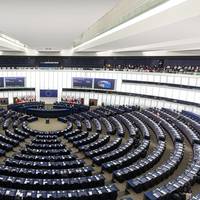
The Waterborne Technology Platform has welcomed the EU’s Sustainable Transport Investment Plan (STIP) which it says is key in facilitating the uptake of sustainable alternative fuels.The European Commission published the STIP on November 5, setting out a roadmap to accelerate the energy transition of aviation and waterborne transport sectors. The STIP identifies investment needs and outlines measures to make better use of existing EU financing programmes in support of the required investments. It also introduces measures to support the implementation of the facilitating regulatory framework.
LNG: Greenwashing or Realism
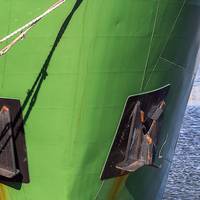
The October delay at IMO of its Net Zero Framework continues to spark debate, and enthusiasm, about net zero fuel choices, including what LNG’s role should be.Debate is expected to continue too, as shipowners face a more complicated regulatory landscape now. Despite the uncertainty created by the delay, regulations continue to force emissions reductions, including existing IMO regulations such as CII and regional regulation such as FuelEU.With the number of dual-fuel LNG ships being ordered higher than methanol or ammonia alternatives…
Amogy and Samsung Heavy Industries Partner on Ammonia Power
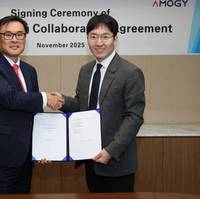
Ammonia-to-power company Amogy has signed a multi-year contract with Samsung Heavy Industries (SHI) for the manufacturing of Amogy’s systems.SHI plans to establish a dedicated facility in South Korea to produce and test Amogy’s systems, beginning with those required for Amogy’s pilot project in Pohang in 2026. The project will demonstrate the technology maturity and economic feasibility of Amogy’s ammonia-to-power systems for distributed clean power generation.This partnership…
Orders for Less Polluting Ships Hold Share
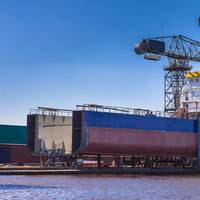
Cleaner-fuel burning ships accounted for 37% of cargo vessel orders in the first 10 months of 2025, unchanged from the year-ago period, as buyers were uncertain about when global rules for cutting maritime emissions will take effect, data from shipping consultancy AXSMarine showed.Overall gross tonnage (GT), an industry measure for vessel capacity, totaled 78 million from January through October, down from 113 million from the year-ago period, AXSMarine data showed.Orders for all of 2024 surged to a 17-year high after ships were rerouted to avoid Houthi rebel attacks in the Red Sea…









